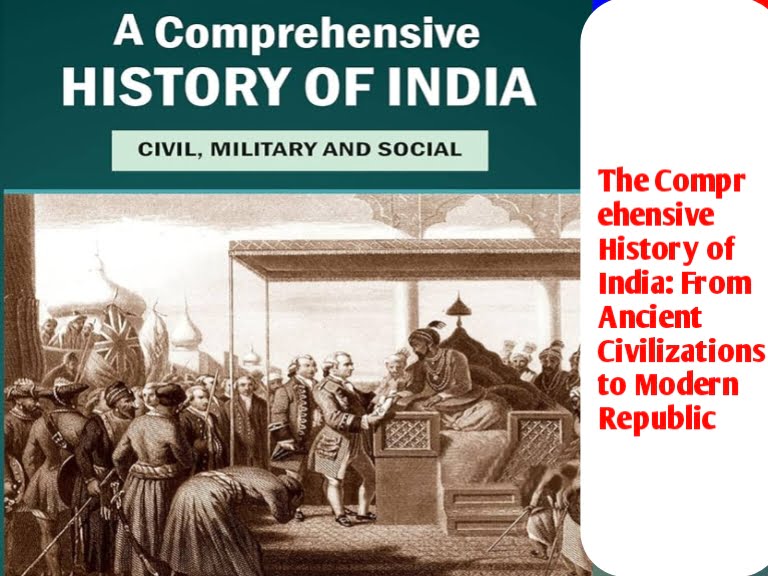The Comprehensive History of India: From Ancient Civilizations to Modern Republic
The Comprehensive History of India
India, a land of diverse cultures, languages, and religions, has a history that spans thousands of years. This article provides an in-depth look at the rich and complex history of India, tracing its journey from ancient civilizations to its current status as a vibrant democratic republic.
Ancient Period:
- Indus Valley Civilization (c. 3300–1300 BCE):
- One of the world’s earliest urban cultures, the Indus Valley Civilization (Harappan Civilization) was located in present-day Pakistan and northwest India. Known for its advanced city planning, including well-laid streets, drainage systems, and large public baths, it was a highly sophisticated society.
- Vedic Period (c. 1500–500 BCE):
- Following the decline of the Indus Valley Civilization, the Vedic Period saw the arrival of the Indo-Aryans. The Vedas, a set of religious texts, were composed during this time. This period laid the foundations for Hinduism and saw the emergence of early social structures.
- Mahajanapadas and Early Kingdoms (c. 600–321 BCE):
- This period was characterized by the rise of sixteen powerful kingdoms and republics known as Mahajanapadas. Important religious and philosophical developments, including Buddhism and Jainism, emerged during this era.
Classical Period:
Reading more…. The History of Bangladesh: From Ancient Civilizations to Modern Nationhood
- Maurya Empire (c. 321–185 BCE):
- Founded by Chandragupta Maurya, the Maurya Empire was the first large-scale empire in India. Ashoka the Great, one of its most famous rulers, played a crucial role in spreading Buddhism across Asia after his conversion.
- Gupta Empire (c. 320–550 CE):
- Often referred to as the Golden Age of India, the Gupta Empire witnessed significant advancements in science, mathematics, astronomy, literature, and art. Figures like Aryabhata and Kalidasa contributed to this flourishing of culture.
Medieval Period:
- Early Medieval Kingdoms (c. 600–1200 CE):
- The decline of the Gupta Empire led to the rise of several regional kingdoms such as the Cholas, Cheras, and Pandyas in the south, and the Palas and Rashtrakutas in the north. These kingdoms saw the development of regional art, architecture, and literature.
- Islamic Invasions and Delhi Sultanate (c. 1206–1526 CE):
- The arrival of Islam in India began with the invasions of Mahmud of Ghazni in the 10th century and continued with the establishment of the Delhi Sultanate. This period saw significant cultural and architectural influence from the Islamic world.
Mughal Period (c. 1526–1857):
- Establishment and Expansion:
- The Mughal Empire, founded by Babur, became one of the most powerful and influential empires in Indian history. Akbar the Great expanded the empire and promoted policies of religious tolerance and cultural integration.
- Cultural Flourishing:
- The Mughal period is noted for its contributions to art, architecture (such as the Taj Mahal), and the development of Indo-Persian culture. The reign of Shah Jahan and Aurangzeb marked the peak and subsequent decline of Mughal power.
Colonial Period:
- British East India Company (1757–1857):
- The Battle of Plassey in 1757 marked the beginning of British control over India. The British East India Company established dominance through trade and military conquest, leading to significant political and economic changes.
- British Raj (1858–1947):
- Following the Indian Rebellion of 1857, the British Crown took direct control of India, initiating the period known as the British Raj. This era saw the establishment of infrastructure such as railways and telegraphs, but also economic exploitation and social unrest.
Independence Movement:
- Early Resistance and Reform Movements:
- The late 19th and early 20th centuries saw the rise of reform movements and early resistance against British rule. Leaders like Bal Gangadhar Tilak and the Indian National Congress (founded in 1885) played pivotal roles.
- Mahatma Gandhi and Nonviolent Resistance:
- Mohandas Karamchand Gandhi emerged as a key leader, advocating for nonviolent resistance and civil disobedience. Major movements such as the Non-Cooperation Movement (1920), the Salt March (1930), and the Quit India Movement (1942) galvanized the masses.
- Partition and Independence (1947):
- After decades of struggle, India gained independence on August 15, 1947. The partition of British India led to the creation of two separate nations, India and Pakistan, accompanied by widespread violence and mass migrations.
Modern India:
- Constitution and Republic (1950):
- India adopted its constitution on January 26, 1950, becoming a sovereign democratic republic. Dr. B.R. Ambedkar played a crucial role in drafting the constitution, which enshrines principles of justice, liberty, and equality.
- Economic Development and Challenges:
- Post-independence, India pursued a mixed economy with an emphasis on self-reliance. The Green Revolution in the 1960s boosted agricultural production, while economic liberalization in the 1990s spurred growth and globalization.
- Contemporary Issues:
- India continues to face challenges such as poverty, corruption, and social inequality. However, it has made significant strides in technology, education, and infrastructure, emerging as a major global player.
Conclusion: The history of India is a tapestry woven with the threads of various cultures, religions, and political entities. From the ancient Indus Valley Civilization to the modern democratic republic, India’s journey is marked by resilience, diversity, and a rich cultural heritage. As India continues to evolve, its historical legacy remains a source of pride and inspiration for its people.
How did you like the information given in our article today, please tell us in the comment section and for more such posts, follow our page The News House, thank you
